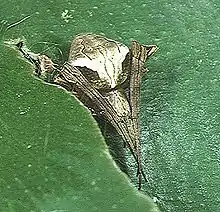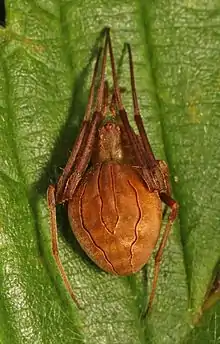Acacesia
Acacesia is a genus of orb-weaver spiders first described by Eugène Simon in 1895.[2] It contains six species with a mostly neotropical distribution, ranging from South America to Mexico. One species, A. hamata, is found in the US as well.
| Acacesia | |
|---|---|
 | |
| Acacesia tenella | |
 | |
| Acacesia hamata | |
| Scientific classification | |
| Kingdom: | Animalia |
| Phylum: | Arthropoda |
| Subphylum: | Chelicerata |
| Class: | Arachnida |
| Order: | Araneae |
| Infraorder: | Araneomorphae |
| Family: | Araneidae |
| Genus: | Acacesia Simon, 1895[1] |
| Type species | |
| Epeira hamata (Hentz, 1847) | |
| Species | |
|
6, see text | |
Description
The backs of spiders in this genus are marked with a dagger shape, outlined in black and surrounded by a triangular folium. On each side of the dagger there are parallel rows of orange-brown dots. Body length of females ranges from 4.3 to 8 millimetres (0.17 to 0.31 in), of males from 3.6 to 6.5 millimetres (0.14 to 0.26 in)[3]
Behavior
As the other species are only known from museum specimens, only the natural history A. hamata is known in any detail.[3][4]
Species
As of April 2019 it contains six species:[1]
- Acacesia benigna Glueck, 1994 – Peru, Bolivia, Brazil
- Acacesia graciosa Lise & Braul, 1996 – Brazil
- Acacesia hamata (Hentz, 1847) – USA to Argentina
- Acacesia tenella (L. Koch, 1871) – Mexico to Brazil, French Guiana, Guyana
- Acacesia villalobosi Glueck, 1994 – Brazil
- Acacesia yacuiensis Glueck, 1994 – Brazil, Argentina
References
- "Gen. Acacesia Simon, 1895". World Spider Catalog. Natural History Museum Bern. Retrieved 2019-05-10.
- Simon, E. (1895). Histoire naturelle des araignées. doi:10.5962/bhl.title.51973.
- Glueck, Susan (1994). "A Taxonomic Revision of the Orb Weaver Genus Acacesia (Araneae: Araneidae)". Psyche. 101 (1–2): 59–84. doi:10.1155/1994/34645.
- Levi, Herbert W. (1976). "The Orb-weaver Genera Verrucosa, Acanthepeira, Wagneriana, Acacesia, Wixia, Scoloderus and Alpaida North of Mexico (Araneae: Araneidae)". Bulletin of the Museum of Comparative Zoology. 147 (8): 351–391.
This article is issued from Wikipedia. The text is licensed under Creative Commons - Attribution - Sharealike. Additional terms may apply for the media files.